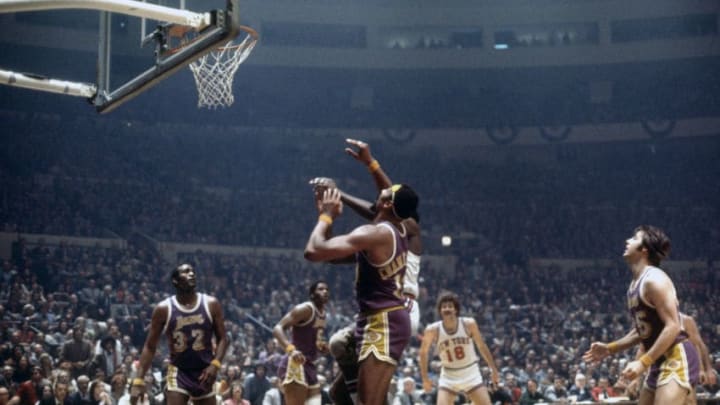With The Last Dance being the center of the sports world, the debate over who was the greatest NBA player ever has arisen. It’s missing Wilt Chamberlain.
The NBA’s “greatest of all time” conversation tends to lend itself to recency bias, as LeBron James and Michael Jordan are players that a lot of people are familiar with. However, it typically fails to acknowledge historical legends like Kareem Abdul-Jabbar, Bill Russell, and Wilt Chamberlain. Between the three, Wilt is not only arguably the best, but he’s also slept on historically despite having a career that is too crazy to make up.
Chamberlain was a cheat code. He was 7’1″ with the athleticism of Zion Williamson, the strength of Arnold Schwarzenegger, and crazy leaping ability. Not only that, but Wilt also led the league in assists in 1967-68 and scored 100 points in a game.
More from Hoops Habit
- 7 Players the Miami Heat might replace Herro with by the trade deadline
- Meet Cooper Flagg: The best American prospect since LeBron James
- Are the Miami Heat laying the groundwork for their next super team?
- Sophomore Jump: 5 second-year NBA players bound to breakout
- NBA Trades: The Lakers bolster their frontcourt in this deal with the Pacers
The start of Wilt The Stilt’s professional career came allegedly when he went by the name of George Marcus. When Wilt was 16 years old, he joined a professional team, the Pittsburgh Raiders, under a fake name. Chamberlain/Marcus dominated and according to the research done on Reddit (take it for what it’s worth), the star scored over 40 points in a game. At the age of 17 he joined the Quakertown Fay and averaged 40.5 points in 8 games, among more eye-popping stats.
From there, the big man joined the University of Kansas Jayhawks to play college ball. In his debut game, Chamberlain scored 42 points and had 29 rebounds and 4 blocks. For the rest of his two seasons there he averaged 30 points and 18 rebounds per game. Following his last season at Kansas, the star joined the Harlem Globetrotters for a year.
Now, hopefully, you’re intrigued by the greatest mythical creature of basketball known as Wilt Chamberlain. He started his NBA career after his one year playing for the Globetrotters. in the rookie center’s debut, he scored 43 points, nabbed 28 rebounds, and played all 48 minutes. That game would set the tone for the illustrious career of the big man who owns 72 NBA records, most of which are for his impressive ability to score, rebound, and never need a break.
Perhaps Wilt’s most impressive season came in his third year in the league. Wilt averaged 50 points and 26 rebounds a game (blocks and steals weren’t recorded back then). He had a crazy 17 offensive win shares and a PER of 32. Unfortunately, Chamberlain didn’t win the NBA title that year due to having a weaker supporting cast and facing the legendary Boston Celtics team of Bill Russell.
Another season that really shows how talented the big man is is his aforementioned 1977-78 season. He averaged an absurd 24 points, 24 rebounds, and 9 assists on his way to winning one of his 4 MVP awards. Aside from LeBron James likely doing it this year, no non-guard has led the league in assists since Chamberlain did it. Not only that, Chamberlain’s PER that season was 24.7 with a strong defensive win shares rating of 11.
Chamberlain won 4 MVP awards, 11 rebounding titles, seven scoring titles and two championship rings. One thing that is relatively underrated about Chamberlain is that he was arguably the second-best defender of the era behind only Bill Russell. Ben Taylor took a close look at it here. Chamberlain led some of the best defenses in the league, especially when he tapered down his scoring.
One of the qualities of a “GOAT” is to be able to do anything asked of you, and Wilt Chamberlain was a great example of that. He could do unheard-of things like block Kareem Abdul-Jabbar’s skyhook and turn up his defense when needed, he could drop 100 points when needed, he could run the offense if the team needed it, grab literally every rebound when asked, and even play just about every minute of every game.
